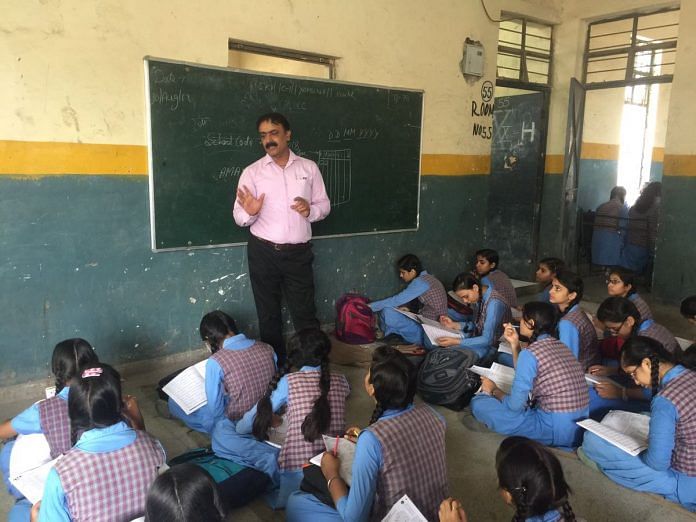Central Advisory Board of Education meets on 15 & 16 Jan, and a couple of issues highlighted by WCD ministry & NCPCR have been put on the agenda.
New Delhi: The Women and Child Development (WCD) Ministry and the National Commission for Protection of Child Rights (NCPCR) have raised a red flag that “a large number of Muslim children are being deprived of their Right to Education”, due to only being imparted religious education. They have also demanded an assessment of whether there is any benefit to minority institutions being exempt from reservations.
ThePrint has learnt that both issues are on the agenda for the Central Advisory Board of Education (CABE) meeting on 15 and 16 January.
The WCD ministry and the NCPCR have demanded that a sub-committee be constituted to find a way to “bridge the gap” in compliance to Article 21-A and Article 30 of the Constitution, to “ensure fundamental right to education”.
The NCPCR has also demanded that a sub-committee be set up by the CABE to assess minority institutions’ exemption from reservations given through the 93rd amendment to the Constitution, i.e. Article 15(5).
Incidentally, another thing on the CABE agenda is a sub-committee report on mainstreaming ‘out-of-school’ children, which has suggested that children in unrecognised schools, madrasas and Vedic pathshalas be counted as ‘out-of-school’ children.
What is CABE?
The CABE is the apex advisory body on education in India and has the representation of all state education ministers, besides a number of stakeholder ministries.
The CABE meeting, to chaired by Union Human Resource Development (HRD) minister Prakash Javadekar is expected to be attended WCD minister Maneka Gandhi, I&B minister Smriti Irani, Culture minister Mahesh Sharma, Minister for Minority Affairs Mukhtar Abbas Naqvi, Youth Affairs and Sports minister Rajyavardhan Rathore, and Social Justice & Empowerment minister Thawarchand Gehlot.
The apex body will assess the state of education, study committee reports on the no-detention clause of RTE Act, mainstreaming of out-of-school children, extension of the RTE Act to senior secondary level, and the issue of girls’ education.
On the higher education side, missions like the Ek Bharat Shreshtha Bharat initiative to boost inter-state linkages and a nationalistic identity, Unnat Bharat Abhiyan to have institutions work closely at gram panchayat level, besides digitisation and Swachh Bharat will also be discussed.
Safety and monetary concerns
The WCD ministry has also expressed concerns over safety issues in schools, in the light of “recent incidents”, and has suggested that Parent-Teacher Associations must be made mandatory to ensure monitoring of safety considerations at private schools which do not have school management committees. It has also advised that private schools must be categorised as per availability of infrastructure and facilities, and the Centre must advise states for the same.
The ministry has also flagged the issue of fee hikes at schools, and observed that the issue of ‘fee regulation’ must be given priority by states. Concerns have been raised about deaths of students at coaching institutes, and the NCPCR has asked that a committee be set up to look into this.
NITI Aayog and others’ proposals
NITI Aayog CEO Amitabh Kant has proposed a ‘massive media campaign’ on education, suggesting that 10-15 per cent of every visual publicity effort, private or public, in all media from print to electronic and social media, be mandatorily devoted to “publicity on education”.
Kant said the NITI Aayog believes that education is going to be a ‘game changer’ in India, and that “popularisation of education is essential on a massive scale so that the messages relevant to education reach every individual from all kinds of media”.
B.B. Kumar, chairman of the Indian Council of Social Science Research, has lamented the “policy stagnation” in the education sector and advised a regular policy update, linkage of manpower planning with educational planning, besides “structural change in education including in course content and curriculum”. He has, interestingly, also pointed at “unimaginative bureaucratic interference discouraging private funding in education”.
Nominated CABE member Anjali Deshpande has advised that the mother tongue be made the medium of education for primary school goers. Another nominated member, Latif Magdum, has suggested that passages from former President Dr A.P.J. Abdul Kalam’s autobiography be in included in textbooks for higher and senior secondary education.
HRD plan to tackle job crisis
The higher education department of the HRD ministry will propose an ambitious plan to improve employability in the 18-23 age group. It proposes to train one crore students in ‘employable skills’ by 2022. While 50 lakh of these will be students in existing professional courses, another 50 lakh will be from non-professional courses.
The All India Council for Technical Education proposes to implement this mission by reducing the credits for classroom courses and increasing them for practical training, besides mandatory student internships, and training with MSMEs and other organisations.
The University Grants Commission will focus on 50 lakh students from non-professional courses by getting market training providers to work with students after college hours and an assistance of Rs 10,000 per student after placement, besides easier skill education loans on self finance mode. This module will start with 5,000 colleges, and later be expanded to 30,000 institutions.
For out-of-college youth, programmes are planned after college hours at campuses to impart skills in automotive manufacturing, graphics and multimedia, travel and tourism, refrigeration and air conditioning, medical imaging technology and so on.



